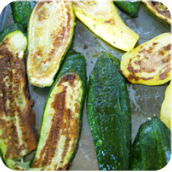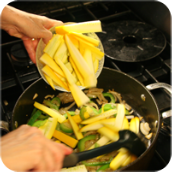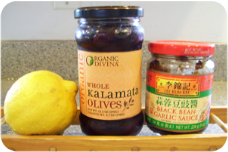Online Magazine
& Cooking Club

In This Issue
Feature Articles
Making heads & tails of
the squash kingdom
6 Tricks to Take the Bland
out of Summer Squash
Zucchini Overload:
how to turn over-
into advantage
5 Fast Ways to Cook Squash +
5 Simple Ways to Dress It Up
In Every Issue
Why We Love It
Top 10 Questions about Squash
The Green Kitchen
Picky Eater Tips
Money Saving Tricks
News from the Farm


Cooking School
Cooking Classes:
Greek Potato Salad
Zucchini Salad Americana
Buying the Best
Storing for Flavor
Prepping Tricks & Tips
Cooking Basics
Recipes, Recipes, Recipes
14 Easy, Creative Dishes Using Summer Squash




















© 2009 Culinary Concepts, Inc., Boulder CO


One of the greatest things about summer squash is its versatility.
It makes a good addition to practically any dish or cuisine. But in the curious way that our strengths are often the opposite face of our weaknesses, zucchini’s marvelous versatility is also the root of its biggest weakness: blandness.
The very reason zucchini is so versatile is that it doesn’t have much flavor on its own. So of course it tastes good with just about anything! Granted, a good, freshly picked squash has some sweetness to it, but blandness still dominates the flavor spectrum.
No doubt, squash’s flavor issues stem from the fact that it’s mostly water. Being as much as 95 percent H2O, it’s no surprise that it tastes a lot like water, which is to say, bland.
Knowing all this clarifies the mission for everyday cooks: If we want to take advantage of squash’s many strong points, how can we prepare it in a way that is flavorful and enjoyable? The key lies in knowing how to concentrate and coax.
In other words, first get rid of the water to concentrate what flavor there is in this watery vegetable. Then coax out that flavor even more with “flavor boosters.”
Concentrate to Get the Water Out and Leave the Flavor Behind
1. Minimize External Cooking Water To begin with, avoid cooking methods that introduce more water, like boiling and poaching.
2. Evaporate Internal Water Instead, use dry-
Coax Out More Flavor with “Flavor-
3. Salt and Pepper, Generously Even concentrated, squash’s flavor can use a little boosting. Start with salt and pepper. As always, go slowly when seasoning, but you may well find that squash requires a little more salt and pepper than usual. You’ll also get better results by seasoning before cooking, so the flavor can better permeate the squash.
4. Brown Nicely When cooking summer squash, don’t be afraid of a little browning. A nicely browned surface adds great flavor.
5. Partner Strategically Finally, balance squash’s milder taste with stronger flavors like chilies, curry, ginger, garlic, lemon, goat cheese and so on.
6. Compensate for Flavor Dilution Sometimes, summer squash must be cooked in a liquid, as in a soup, stew, or saucy dish like Chicken Cacciatore. Without the flavor-

Helpful Hint:
How to Add a Squash Boost to Your Meals
Want some interesting ideas for using zucchini and other summer squash? See “Zucchini Overload: Turning Over Abundance into Advantage”
Rich brown is a sign of good flavor, not overcooking. Above, roasted zucchini slices give a flavor boost to
Roasted Zucchini Soup. Below, half moons are browned before adding to
The fast, hot heat of stir frying is a great way to concentrate the flavor of yellow squash.
6 Tricks to Take the Bland out of Summer Squash




Good Strategic Partners for Summer Squash
A Little Heat: Salsa, Szechwan sauce and chili sauce



Sweet or Salty: BBQ sauce, humanely-
Sour or Pungent: Fresh (not bottled) lemon, kalamata olives, Chinese black bean sauce

Next Page

Prev Page